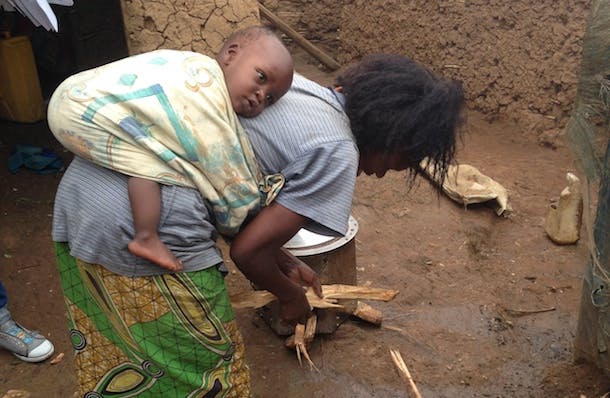
This is a guest article by Katherine Arnold, Senior Program Associate, Humanitarian, for the Global Alliance for Clean Cookstoves
In Rwanda, more than 72,000 refugees are living in five refugee camps spread across the country. The majority of these refugees are from the Democratic Republic of Congo and fled from their homes into Rwanda to escape ongoing violent conflict between rebel groups.
Life in these camps is difficult – food, cooking fuel, lighting, and livelihood opportunities are in short supply. Women and children are at high risk for assault, especially when leaving camp to collect firewood to supplement monthly wood rations.
As one woman I spoke with in Gihembe camp stated, “When we go to collect firewood, sometimes we get raped. Once I was in the hospital and my daughter had to go collect wood for me. My daughter got raped. But when we get raped we keep quiet because we don’t want problems with our husbands. The boys, if they go, get beaten.”
In June, the UN Refugee Agency (UNHCR) and the Global Alliance for Clean Cookstoves, an initiative hosted by the United Nations Foundation, led a joint field mission to Kigeme camp with 30 humanitarian experts from a variety of fields including the energy, environment, livelihoods, and protection sectors to speak with refugees, view ongoing energy projects, and collectively develop recommendations on how to improve refugees’ lives.
These experts found a surprising problem reiterated repeatedly by refugees: the firewood ration provided to them was too small, and the wood was always wet. This meant that families had to chop the wood up into small pieces and dry it inside their tightly confined homes. In most cases, refugees used the firewood ration for cooking while it was still wet, which both increases the quantity of wood required for cooking and emits large amounts of smoke highly concentrated with harmful particles and chemicals. Not only does this cause refugees to use up their firewood rations more quickly, but it also increases their risk for respiratory disease as a result of toxic smoke inhalation.
The main solution recommended by the group was seemingly simple – provide dry wood instead of wet. Yet the process behind this was complex. The wood is procured and purchased from local small suppliers by Rwanda’s Ministry of Disaster Management and Refugee Affairs (MIDIMAR), then distributed to refugees by UNHCR. In a complex system involving suppliers, government, and UN agencies, changing the type of product provided is no easy task.
Yet when MIDIMAR heard from 30 experts that this was a priority and saw the research that burning wet wood emits exponentially more toxins and uses a greater quantity of wood, they committed to find a solution. In November, MIDIMAR announced that it will begin purchasing only dry wood from its suppliers and will be standardizing the size of wood so that it can be burned more efficiently. At the same time, UNHCR Rwanda will introduce a system of onsite checks to ensure the wood meets designated criteria.
This intervention is but a small piece of the recommendations made by UNHCR, the Global Alliance for Clean Cookstoves, and the group of experts that visited Kigeme in June. Yet it’s the first step in addressing some of the intractable problems of fuel and energy in Rwanda’s refugee camps that directly affect the health, safety, food security, environment, and livelihoods of thousands of families.
You can find out more about the problems of safe access to fuel and energy (SAFE) in humanitarian settings here, and more about the UN Refugee Agency’s strategy on fuel and energy access here.



 View All Blog Posts
View All Blog Posts